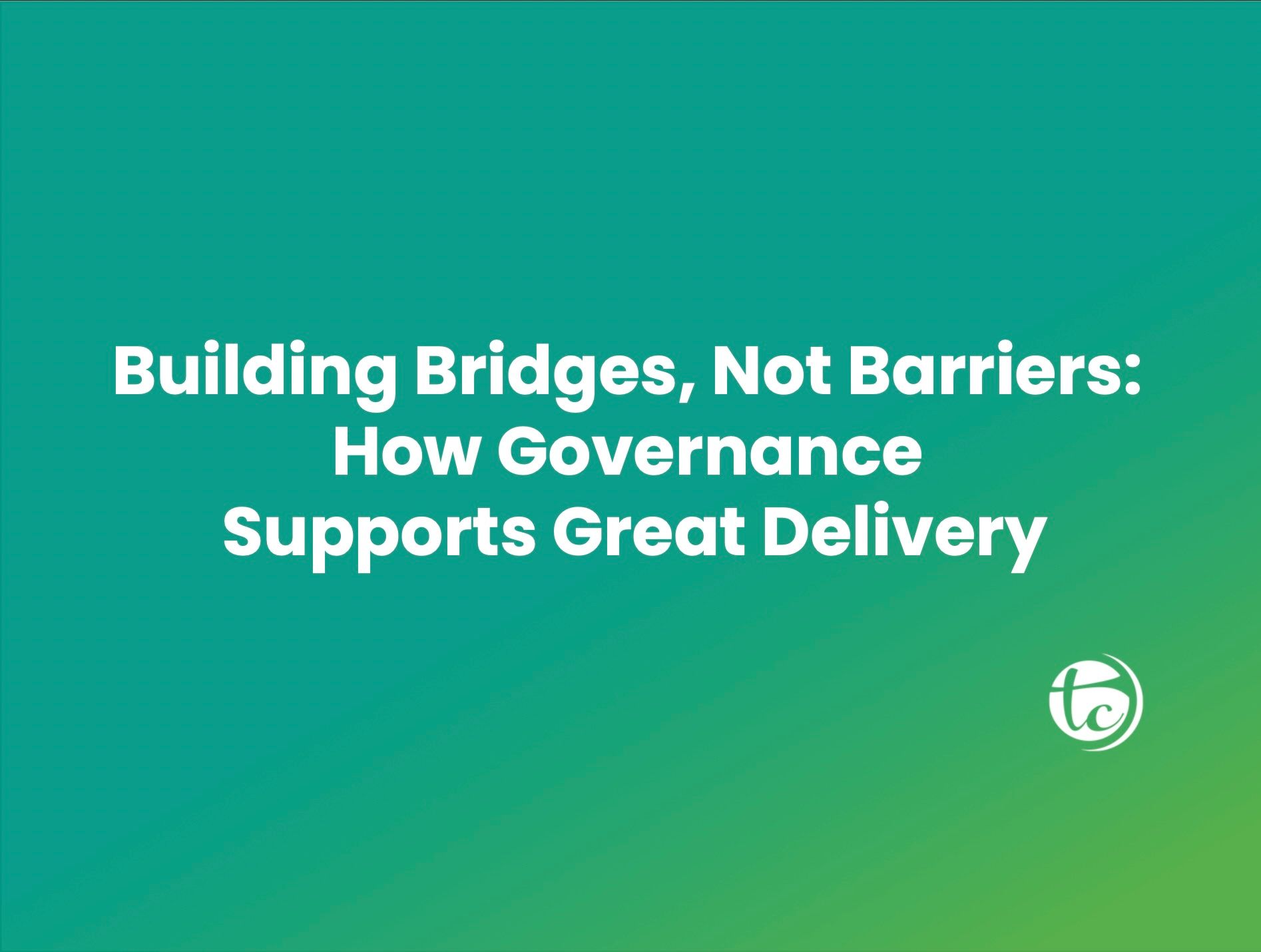What is a PMO in 2025?
In 2025, businesses need to move fast, adapt constantly, and deliver results under pressure. A great PMO doesn’t slow things down; it clears the path for success.
A PMO (Project, Programme, or Portfolio Management Office) provides the structure, clarity, and insight needed for projects and programmes to succeed. It doesn’t manage projects; it creates the right environment for delivery teams to thrive, leadership to make informed decisions, and organisations to stay aligned to strategic goals.
At its best, a PMO brings consistency, transparency, and focus, helping organisations prioritise the right work, remove barriers, and track real progress. It ensures that project managers, leadership, and teams have the tools, data, and frameworks they need to deliver effectively.
What does a PMO really do?
1. The engine that keeps delivery moving
Creating the structure and oversight that enables projects and programmes to stay on track.
2. The link between ideas and action
Connecting strategy to execution by ensuring that the right work is prioritised and aligned with business goals.
3. A source of support, not red tape
Helping teams navigate challenges and manage risk effectively, rather than enforcing process for the sake of it.
4. The voice of reason in decision-making
Providing leadership with clear, data-informed insights to guide investment and prioritisation decisions.
5. A function that flexes with the business
A great PMO doesn’t just evolve. It anticipates what the organisation needs next, adapting to stay relevant, effective, and value-driven.
👉 Does your PMO help your organisation move forward, or is it just another process to manage? If you’re not sure, let’s talk.
Why PMO Still Matters in 2025
With organisations under increasing pressure to deliver results, manage change, and make smart investment decisions, the PMO plays a critical role not by running projects, but by ensuring that delivery is well-structured, well-supported, and aligned to business needs.
1. Data-Influenced Decisions, Not Just Dashboard Metrics
Good decision-making isn’t about blindly following dashboards and reports; it’s about using data alongside experience, context, and strategic thinking. A strong PMO ensures that leadership has access to reliable insights but also the analysis and interpretation needed to turn numbers into meaningful action. The right PMO guides informed decisions, not just data-driven ones.
2. Guiding Change, Not Just Reporting on It
Transformation isn’t a one-off event; it’s an ongoing journey. A strong PMO does more than track and report on change; it provides the insight and structure to help organisations steer it with intent. By offering clarity on progress, risks, and dependencies, the PMO ensures leadership can make informed decisions, keeping change on course rather than reactive and chaotic.
3. Governance as an Enabler, Not a Hurdle
Governance should support delivery, not slow it down. A strong PMO ensures governance is built into the way teams work. Not as layers of approval, but as a framework for clarity, risk management, and alignment. The right governance provides confidence that the right decisions are being made, without unnecessary delays.
4. Getting the Best from Your People
With increasing demand and limited capacity, organisations need to be smarter about how they deploy their people. A PMO helps prioritise work, reduce bottlenecks, and ensure teams are focused on what really matters. The result? The right people, in the right roles, working on the right things; without overload or wasted effort.
5. Real Business Value; Beyond the Numbers
Not everything that matters can be neatly measured in financial metrics, yet too many projects focus on ROI and cost savings while losing sight of their real purpose. A strong PMO ensures value isn’t just a numbers exercise; it keeps stakeholders focused on delivering meaningful outcomes and makes benefits tracking simple, relevant, and worth doing.
👉 Is your PMO keeping up with the demands of today’s business environment? If not, let’s explore how to make it more effective.
What Makes a Successful PMO in 2025?
Having a PMO is one thing; having one that genuinely empowers better decision-making, prioritisation, and delivery is another.
1. A Focus on Value, Not Just Process
The best PMOs are outcome-driven. They don’t just track progress; they ensure that projects and programmes are set up for success and delivering meaningful results.
2. A Seat at the Table, Not Just a Support Function
A PMO that sits on the side-lines won’t add value. The best PMOs are part of the big conversations actively shaping portfolio planning, prioritisation, and funding decisions. It’s about guiding the right work, not just tracking it.
3. Simple, Practical, and Effective
Too much process slows things down; too little leads to chaos. The right balance ensures teams have what they need to deliver effectively without unnecessary overhead.
4. Leveraging Technology for Impact
AI, automation, and PPM tools are transforming how PMOs operate, streamlining admin and providing real-time insights. But technology is only as effective as the people using it. A smart PMO integrates the right tools to support decision-making and delivery, freeing teams to focus on strategy, problem-solving, and driving real outcomes.
5. Building Capability for the Long Term
A great PMO doesn’t just keep projects on track; it equips teams with the skills, structures, and confidence to deliver successfully on their own. The goal isn’t just to manage work; it’s to create a sustainable way of working that continues to add value long after the PMO’s involvement.
Final Thoughts
A PMO should be the organisation’s biggest enabler of success, not just a reporting function. If yours isn’t delivering real value, let’s talk about how to change that.

A Safe Harbour for Work That Matters Over the past few months on the Norfolk coast, and exploring the Broads, boats have been a constant part of my view — moored, passing, gliding by. Back in Northamptonshire, there were no waves or tides, but we did have canals — another ecosystem with its own slower rhythm, narrowboats with their routines, and a way of life that seems to move at walking pace. Soon we’ll be in Scotland, close to the wide Forth estuary — tidal, busy, and full of energy. It’s a very different stretch of water to Norfolk’s quiet channels, and it’s had me thinking about how PMO also has to work differently depending on its setting. The Harbour Picture Picture a harbour at dawn. Fishing boats head out early, ferries prepare for their first passengers, yachts wait for the right wind. Each boat has a different job, a different pace, and each one is essential to the harbour’s purpose. PMO works in the same way. It runs through portfolio, programme, and project work, and each plays its part when set up for what’s needed. Together, they keep delivery moving in the right direction. The Three Ps: Portfolio, Programme, Project Think of it like the harbour: Portfolio PMO: The Harbour Master Sets direction and decides which boats head out and when. Programme PMO: The Ferries and Trawlers Keeps the routes open, brings results back to port, and makes sure the harbour stays productive. Project PMO: The Small Boats and Crew Handles the day-to-day, checks the kit, keeps the logs, navigates the details, and gets close to the action. Each one plays a role in keeping the harbour working as a whole. Making It Work A small boat doesn’t need a full crew. A ferry doesn’t need a trawler’s nets. A harbour doesn’t need a fleet pulling apart. PMO is the same. Project PMO supports delivery. Programme PMO keeps routes clear. Portfolio PMO sets direction. The value doesn’t come from one level trying to be something it’s not — but from each doing the work that matters. Avoiding the Trap Sometimes project-level PMO is dismissed as “just admin.” Sometimes every PMO is pushed to look strategic, even when that isn’t what’s needed. True PMO maturity isn’t about piling on process or having the flashiest title. It’s about purpose — providing the right support, in the right place, at the right time. A Safe Harbour for Work That Matters A good harbour doesn’t just have big ships or shiny yachts. It has the right mix of vessels, ready for the day’s work. That is what PMO is for me: a safe harbour for work that matters — where strategy is shaped, programmes flow, and projects deliver with confidence. From Canals to Coastlines As we head north to Scotland, I know the boats will catch my eye again. Whether it’s a canal, a harbour, or the open sea, the message stays the same: PMO works best when ready for the journey ahead — helping every boat play its part in work that truly matters. Because when the harbour is well run, every boat gets where it needs to go. That’s when the strategy moves forward, the programmes flow, and the projects deliver without being swamped by the tide. Wishing you safe travels in your own waterways ...and if you’re looking to steady your harbour or set a new course, let’s talk.

If governance feels like a burden, it’s probably broken. It shouldn’t be a tick-box exercise or a blocker. Good governance brings confidence, clarity and calm. It helps teams focus on what matters, surface problems early, and make better decisions. It enables delivery. It protects value. It creates space for people to do their best work, not get buried in process. It’s not about slowing things down. It’s how we make sure the right things move forward. A good PMO knows this. It’s not the enemy of delivery; it’s your best friend

We expect every project to justify itself with a business case… but when did the PMO last write one? We challenge delivery teams all the time: 💡 What’s the benefit? 💷 Is it worth the investment? 📏 How will you measure success? But the PMO? We quietly set up, get stuck in, and rarely ask the same questions of ourselves. We know we’re valuable but have we ever taken the time to explain why, in the same language we ask of others? If your PMO had to write a business case today… what would be in it?

Lately I’ve noticed a trend. More and more PMO roles are asking for specific industry knowledge. It’s made me pause and think about what organisations are really looking for. I’ve worked in higher education, financial services, insurance, the public sector, manufacturing and retail to name a few. Each sector has its quirks, but what a good PMO delivers is clarity, confidence and momentum. A good PMO brings structure, insight and the right level of control to make things happen. Not get in the way. We help people make better decisions, focus on what matters and move forward with purpose. Crucially, a strong PMO knows how to flex. We don’t apply a one-size-fits-all model. We bring expertise that can be shaped to suit culture, ways of working and appetite for risk. That’s where the real value lies. I don’t need to be an expert in your industry to make a meaningful difference. Part of the role is quickly understanding how the organisation operates. Then applying what works best. Of course, there are exceptions. But in most cases, being industry agnostic is a strength. It brings fresh thinking, challenge and a broader view. I actively seek new sectors for exactly that reason. Is this push for industry experience part of the buyer’s market we’re in? Possibly. It could also be a missed opportunity to do things differently. Are we too focused on industry experience in PMO hiring? When PMO roles ask for sector-specific experience, I get it. It can feel like a safer choice. Someone who knows the environment, the challenges, the language. But I keep wondering what we might be missing. There’s often an assumption that industry experience makes someone a safer pair of hands. That they’ll already get the systems, the acronyms, the unwritten rules. In fast-moving or complex environments, it can feel like one less thing to explain. A good PMO isn’t there to run the business. We’re here to make change happen. We bring structure, clarity and focus. We help teams prioritise. We support better decisions. We spot risks early. We connect the dots and keep delivery moving. These are skills that cut across industries. In fact, stepping into a new sector often sharpens our ability to ask better questions and notice what others may have stopped seeing. Hiring someone with the same background might feel like the obvious choice. Someone with fresh perspective and a wider lens can often help you move forward faster.

On International Women’s Day, I continue to celebrate the woman who inspires me every single day: my daughter. She isn’t fearless, but she faces her fears with quiet determination. She has doubts, but she stands firm in her values. She is stronger than she realises, resolute in ways that amaze me. She’s studying film production and looks to build her future in cinematography: a field where women remain underrepresented. With her talent, determination, and unwavering passion, I have no doubt she will make her mark. She is my role model, and I couldn’t be more proud. #IWD #Inspiration #StrongWomen #FutureCinematographer

When people hear the word GOVERNANCE in project management, it often brings to mind rigid processes and endless forms. For many organisations, governance is seen as something that satisfies audit requirements but gets in the way of delivery. But does governance really have to be that way? Absolutely not. When done right, governance becomes a crucial part of successful delivery. And both PMOs and project managers share responsibility in ensuring it works effectively without becoming a burden. Governance: A Mindset Shift Too often, I’ve seen organisations where governance is implemented only to cover audits, but with an attitude that it shouldn’t “slow down” delivery. This reflects a deeper misconception that governance is a necessary evil; something to work around. What’s needed is a shift in mindset, especially at the leadership level. This isn’t about choosing between governance and delivery. When embedded correctly, it supports delivery seamlessly, rather than hindering it.




